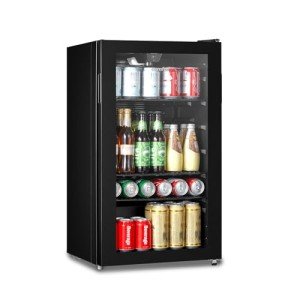20 Myths About Drink Fridges: Busted
Commercial Drink Fridges: The Essential Guide for Businesses
In the competitive landscape of the food and beverage market, maintaining the quality and accessibility of drinks is paramount for service success. Commercial drink fridges play an important function in this aspect, ensuring that both disposable and non-perishable drinks are stored efficiently, marketed appealingly, and easily accessible to clients. This article offers an extensive take a look at commercial drink fridges, their types, functions, and advantages, while resolving often asked concerns to help company owner in making informed decisions.
Tabulation
- Introduction to Commercial Drink Fridges
- Types of Commercial Drink Fridges
- 2.1. Glass Door Refrigerators
- 2.2. Undercounter Refrigerators
- 2.3. Countertop Fridges
- 2.4. Beverage Dispensers
- Secret Features of Commercial Drink Fridges
- Advantages of Using Commercial Drink Fridges
- FAQs
- Conclusion
Introduction to Commercial Drink Fridges
Commercial drink fridges are specialized refrigeration units developed to store and display a variety of drinks, consisting of sodas, juices, beer, wine, and more. Unlike domestic fridges, these systems are constructed to hold up against the strenuous needs of commercial environments, where they need to keep products at optimum cooling temperatures while making the most of presence and ease of access for clients.
Types of Commercial Drink Fridges
There are various commercial drink fridges readily available on the market, each accommodating particular needs and environments. Here are some of the most common types:
2.1. Glass Door Refrigerators
- Description: These fridges feature big glass doors that offer visibility for consumers while keeping the drinks cold.
- Ideal Use: Perfect for corner store, cafes, and dining establishments that desire to showcase their beverage offerings.
2.2. Undercounter Refrigerators
- Description: Designed to fit under counter spaces, these fridges are compact yet effective.
- Perfect Use: Great for bars and dining establishments with limited area; they permit for simple access to drinks without occupying floor area.
2.3. Countertop Fridges
- Description: Smaller systems that rest on countertops, enabling for quick access to beverages.
- Ideal Use: Suitable for cafes and coffee shops where personnel need quick access to drinks for consumers.
2.4. Beverage Dispensers
- Description: These units dispense drinks like soft drinks, juices, or iced tea straight, frequently geared up with several taps.
- Ideal Use: Common in lunch counter and occasions requiring high-volume beverage service.
Secret Features of Commercial Drink Fridges
When thinking about a commercial drink fridge, numerous crucial functions should be taken into consideration:
- Temperature Control: Efficient cooling systems maintain optimum temperature level varieties, generally between 33 ° F to 40 ° F( 1 ° C to 4 ° C), to ensure beverage
- freshness. Energy Efficiency: Many models are created with environmentally friendly innovations, decreasing energy intake and operating expense.
- Interior Lighting: LED lighting enhances visibility, making it simple for customers to see the readily available items.
- Shelving Options: Adjustable shelving enables versatile company of drinks, accommodating different bottle sizes and types.
- Security Features: Lockable doors provide protection versus theft, which is specifically essential in retail environments.
Advantages of Using Commercial Drink Fridges
Investing in a commercial drink fridge offers several benefits that enhance organization operations:
- Improved Sales: Effective display and availability to beverages increase impulse purchases and overall sales.
- Quality Preservation: Proper refrigeration guarantees that drinks preserve their taste and freshness, which is necessary for client fulfillment.
- Brand Visibility: Transparent glass doors display your product range, boosting branding and marketing efforts.
- Space Efficiency: Many models are created for ideal space usage in hectic commercial settings.
Function
Advantage
Temperature Control
Keeps drinks fresh and enticing
Energy Efficiency
Minimizes electricity expenses and promotes sustainability
Interior Lighting
Draws in clients and assists in item selection
Adjustable Shelving
Maximizes storage based on stock needs
Security Features
Safeguards against theft
Frequently asked questions
Q1: How do I choose the ideal size of drink fridge for my organization?
Picking the ideal size depends upon your available space, the volume of beverages you prepare to stock, and customer traffic. Step your designated location and think about models that fit those measurements while meeting your storage needs.
Q2: Are commercial drink fridges energy-efficient?
Numerous modern-day commercial drink fridges are developed with energy-saving innovation and insulation to minimize energy intake. It's suggested to look for the ENERGY STAR label for optimum effectiveness.
Q3: How often should I maintain my fridge?
Routine maintenance is crucial for the longevity of your commercial drink fridge. A great guideline of thumb is to clean it every one to 3 months. Extra look at temperature settings and door seals must be performed routinely.
Q4: What temperature level should my drink fridge be set at?
A lot of beverage refrigeration should preserve a temperature level in between 33 ° F and 40 ° F (1 ° C to 4 ° C) to make sure drinks are cold but not frozen.
Q5: Can I utilize a property fridge for commercial purposes?
While property fridges may work in a pinch, they are not constructed for the heavy demands of commercial settings. For ideal efficiency and energy performance, it's best to buy devices created for commercial use.
Conclusion
In conclusion, commercial drink fridges are a vital investment for any organization that offers beverages. With various types and functions readily available, understanding the specific needs of your company will assist in selecting the right model. Drinks Fridges of improved sales, quality preservation, and enhanced presence can significantly contribute to a company's success. As the industry continues to progress, having the best equipment ensures that services can fulfill consumer expectations while prospering in a competitive marketplace.
